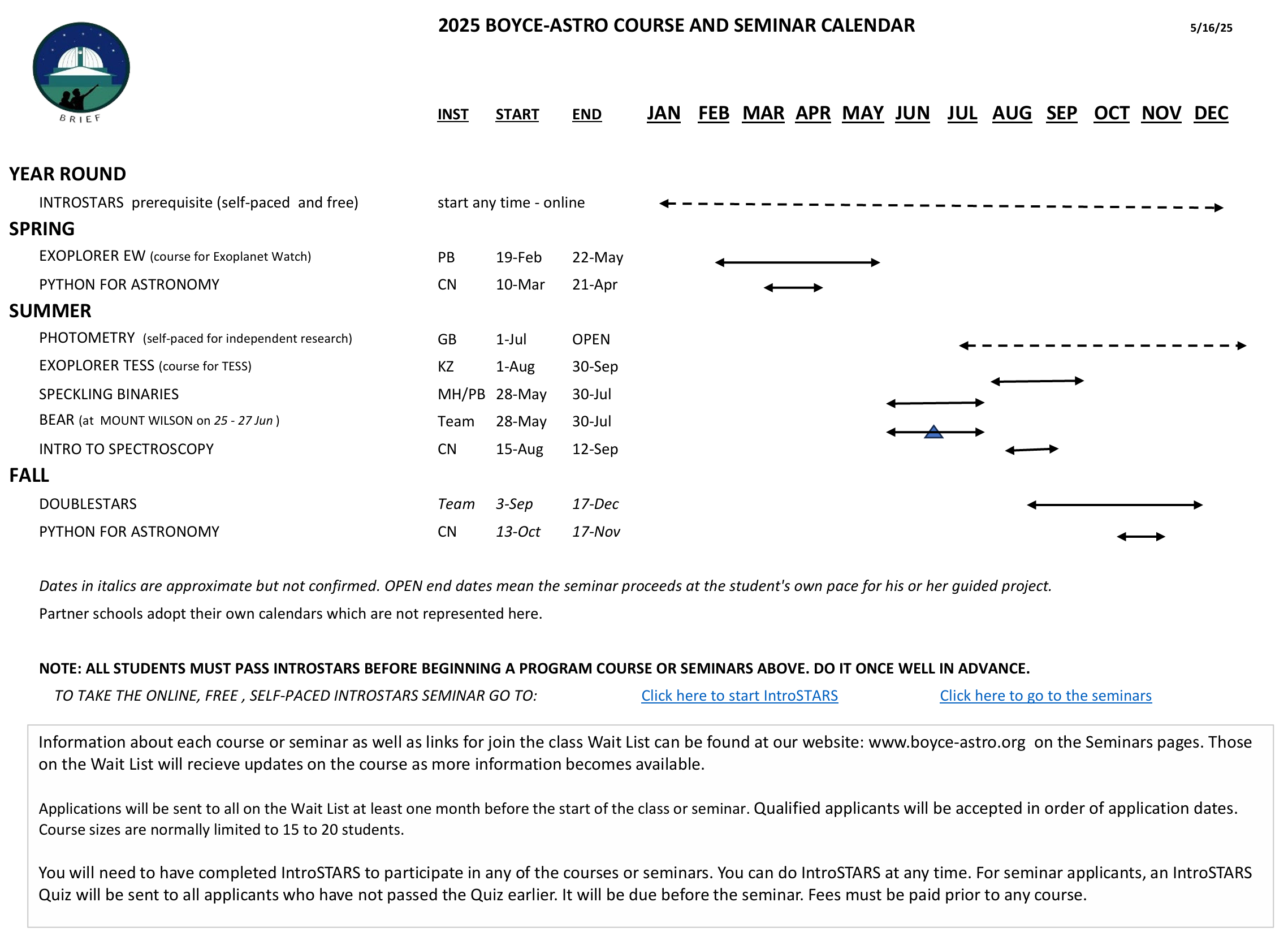Annual Calendar
Boyce-Astro Courses and Seminars
Completion of IntroSTARS™ is a required prerequisite for these courses and seminars.
ASTROMETRY
DoubleSTARS™
DoubleSTARS™ is a comprehensive course covering the entire process of conducting scientific research project in a team environment. It begins with learning about wide binaries and progresses through proposal development and presentation, observation, analysis, scientific poster creation, and concludes with a written scientific paper. The course provides support to help participants get their papers published. It is highly recommended for early participation to gain the foundational experience needed for further observational science work.
Course type: Hybrid
Duration: ~12 weeks
Telescope hours: 1 – 2
Product: published paper
Speckling Binaries
The Speckling Binaries participants learn techniques for measuring close binary stars using speckle interferometry. Speckle observations virtually eliminate atmospheric blurring and are conducted using a Boyce-Astro remote observatory. Students will determine whether the published orbit ephemeris continues to be statistically correct or recommend a new model based on their analysis. Students are guided through authoring their scientific paper or poster and are supported through publication.
Course type: Hybrid
Duration: ~10 weeks
Telescope hours: 5 – 10 of Boyce-Astro observatory time
Product: published paper
BEAR™
Students who join Boyce-Astro for an Experience in Astronomical Research (BEAR™) program participate in the Speckling Binaries course and go to the historic Mount Wilson Observatory (MWO) for further observations at its 60” research telescope (largest in the world just over 100 years ago). The two day and one night experience includes complete tours of all the research facilities, food lodging at the historic “Monastery”, and interaction with engineers and scientists working there.
Course type: Hybrid & Onsite at Mount Wilson
Duration: ~ 10 weeks
Telescope hours: ~5 of MWO and 5 – 10 of Boyce-Astro observatory time
Product: published paper
PHOTOMETRY
Exoplorer™ Program
The Exoplorer program is dedicated to training participants to make exoplanet observations to submit results to NASA exoplanet databases. Observations may also be presented in scientific posters or published papers at the student’s discretion.
Exoplorer™ EW
The principal objective of NASA’s Exoplanet Watch (EW) program is to provide accurate timing and related data for the James Webb Space Telescope (JWST) exoplanet observations. In Exoplorer™ I participants are introduced to exoplanet science, exoplanet databases, and the basics of time-series photometry. Students will reduce observation data with EXOTIC and submit results to the American Association of Variable Star Observers (AAVSO) for incorporation into the into NASA’s EW database, with recognition given to their observations on the EW website. The participant’s final project includes targeting an exoplanet to observe, planning the observation, reducing the data, and submitting the results for the EW website and use for the JWST program.
Course type: Hybrid
Duration: ~ 8 weeks
Telescope hours: 4 – 8 of Boyce-Astro Observatory or Las Cumbres Observatory time
Product: Posted NASA Exoplanet Watch Observation; future observations
Exoplorer™ TESS
The Transiting Exoplanet Survey Satellite (TESS), managed by NASA and MIT, is designed to discover thousands of exoplanets orbiting the brightest dwarf stars in the sky. However, to confirm these exoplanet candidates, further observations using various techniques are required. The TESS Follow-up Observing Program (TFOP) is a large group of professional astronomers dedicated to this essential work.
In this course, students will learn the rigorous analysis required for TFOP Sub Group 1. Members of this subgroup perform photometric observations of (candidate) exoplanet transits and analyze the data using AstroImageJ software. As part of the course, students will conduct observations using the Boyce-Astro observatories or Las Cumbres Observatory (LCOGT) telescopes. Upon completion, interested students will receive assistance in joining TFOP SG1.
This course can be treated as a continuation of Exoplorer™ EW.
Course type: Hybrid
Duration: ~12 weeks
Telescope hours: 5 – 10 of Boyce-Astro Observatory or Las Cumbres Observatory time
Product: Interested students will be offered help in qualifying for and joining TFOP SG1
Photometry – Independent Research
This advanced course provides a complete experience in doing time-based photometry through a hands on project selected and conducted by the student. The research project is fully supported by tutorials, instructor guidance as needed on the student’s own schedule, and Boyce-Astro telescope time. Observations of eclipsing binaries, cataclysmic variables, Delta Scuti, RR Lyrae, or other short period variable stars are well suited for the student’s project and scientific publication.
Course type: Asymmetric online with Instructor Guidance as needed
Duration: Self-paced at student’s discretion
Telescope hours: < 20
Product: As determined by student
Intro to Spectroscopy
Students learn about starlight, its propagation and the the spectral lines of emission and absorption. Students will use spectral signatures to determine the chemical composition of stars, and other properties such as color, temperature, and radial velocities. Data from the James Webb Space Telescope (JWST) and other professionally observed spectral data will be used. Students will also learn how to observe spectra with their own telescope using a grating. Use of Python and Jupyter Notebooks is included.
Course type: Hybrid
Duration: ~ 5 weeks
Spectral data: JWST and other spectra data; data from student’s own telescope
Product: published paper
Python for Astronomy
This seminar will introduce you to Python, Markdown Syntax, Jupyter Notebook and much more. Participants learn how to query large amounts of data from the Gaia or Kepler satellite databases using Python within a Jupyter Notebook. They then analyze and filter this data to plot Hertzsprung-Russel Diagrams for thousands of stars in our immediate solar neighborhood and distant globular clusters. The seminar will have a specific example project basis.
Course type: Hybrid
Duration: ~ 5 weeks
Data used: Gaia, Kepler, TESS
Product: Student’s own database visualization
These courses collectively provide foundational knowledge and advanced observational and data
reduction skills, enabling participants to pursue research and publish findings with ongoing support from
Boyce-Astro’s observatories and instructors.

